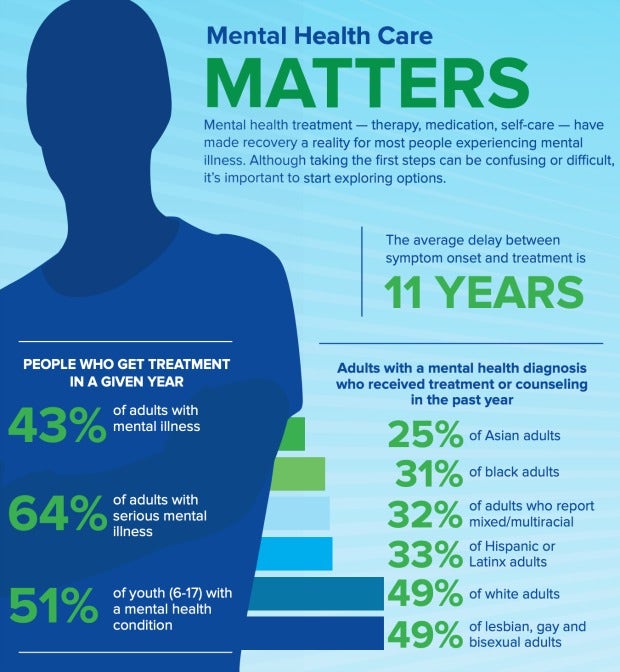Why Trump's Approval Of The USDA's New SNAP Rule Endangers People With Undiagnosed Mental Illness
Comedian Felicia Michaels knows from experience.
 Getty
Getty If you know me a bit, you might know I grew up on food stamps with a mentally ill and handicapped mother. So to see our government kicking three quarters of a million people off of food stamps, now known as SNAP, has left me physically shaken and angry.
What is SNAP?
SNAP is an acronym for the Supplemental Nutrition Assistance Program (SNAP), formerly known as the Food Stamps Program.
This week, Trump gave final approval to a new rule proposed by the U.S. Department of Agriculture (USDA), that will remove nearly 700,000 people from the federal food-stamp program by "[pressing] states to carry out work requirements for able-bodied adults without children that governors have routinely been allowed to waive, especially for areas in economic distress."
The new SNAP rule applies to able-bodied adults without dependents (ABAWD) between the ages of 18 and 49. Sounds fair. Maybe.
Here's my take on it.
At the age of 18, I was told by a social worker if I didn’t move out of my mother’s house she would lose her housing, not to mention that food stamps were automatically off the table.
I grew up in a small town with no family car and no public transportation from the ages of 12 to 18. There were very few jobs there, with a population of around 8,000. Now it's about 15,000 strong.
There was no bus back then to take you in and out of Fountain to the big city of Colorado Springs where opportunity awaited. Thankfully, there is a bus now that leaves/arrives two times in the afternoon.
I would imagine it’s still hard to find work under this situation for the poor. In fact, not having a car is one of the primary reasons the poor have a hard time finding and or keeping jobs. Better schools, less crime and lower poverty are hard to unlock without reliable transportation.
The legal definition of a person as able bodied is that they "function normally in society and they do not have any physical or mental disability."
Let's expand on this.
When I was a kid, we lived in an extremely poverty stricken area of apartment complexes so cheaply built it was normal to come home every couple of years to one of the buildings on fire, either due to shoddy building practices and or drug related activities.
My mother herself, drugged up to the gills legally by doctors, would often set her recliner on fire with a lazy cigarette falling from her good hand as she fell asleep in it. Physically unable to move herself when the smoldering would eventually morph into flames, she would scream to me in the middle of the night to wake up and put the recliner out.
But I digress.
According to experts, poverty in childhood is associated with lower school achievement; worse cognitive, behavioral, and attention-related outcomes; higher rates of delinquency, depressive and anxiety disorders; and higher rates of almost every psychiatric disorder in adulthood.
Here's a look at just a few of the most recent statistics from the National Alliance on Mental Illness (NAMI):
- It is estimated that less than 50% of the mentally ill adult population in our country receive treatment
- Over 13% of U.S. adults with serious mental illness had no insurance coverage in 2018
- 70.4% of the youth in the juvenile justice system have a diagnosed mental illness
Wait, let me unveil the kicker — 60% of U.S. counties do not have a single practicing psychiatrist.

The thing I have thought about off and on throughout my life are the people in my neighborhood of Fountain, Colorado; the single mothers, the elderly that were housebound, the soldiers (Fountain is next to Fort Carson) and their young families who had a hard time getting by.
But mostly I think about the family that lived behind us in the fourplex we shared.
My mother would always warn me about them, saying they were nothing but trash. Their mother was an extreme hoarder and so religious she wouldn't allow her kids to play at our house because my mother let me watch reruns of "Bewitched" in the afternoons after school.
The father was always on workman's comp, even though I would watch him physically working on cars and replacing engines he would sell on the side. He was a boisterous fella who often screamed about his distrust of the government, the rich and anyone who was overly educated.
He was so paranoid about such things he refused to take two of his young daughters who were constantly prone to ear infections to the doctor — so much so that they both went eventually deaf, leading him to brag to all the neighbors that although they went deaf, at least he got to screw the government out of the SSI (Social Security Income) payments he got for the both of them.
As a child, I hated that family.
I hated that they made their two daughters deaf. I hated that my mother who couldn't physically move her body around due to a massive stroke at the age of 35 got so little from the government to survive because of people like this.
But as an adult, I understand now that the adults in that family had either severe cognitive deficits and or mental illness. They were definitely not able-bodied, although no one would necessarily known it from afar.
Honestly, I could give a rat's a— about what happened to those parents, but I do think all the time about those two little girls.
I also think about what happens to children in underserved families like my own who turn 18 and have no safety net. Those young adults who themselves might have mental illness or cognitive deficits, the bright ones stuck in tiny towns with no car to get to jobs, and those who struggle with scant skills to find a job, let alone flourish at one.
I think on how the political leaders in our country are tasked to reason what is the best for all of us as a whole; how they have a responsibility to educate themselves on every statistic regarding those who are not able-bodied, including those who experience a mental illness during their lifetime.
According to NAMI, approximately 47.6 million American adults, about 1 in 5, experienced a mental, behavioral or emotional disorder that met criteria for diagnosis in the past year, and the average delay between the onset of mental illness symptoms and treatment is 11 years.
For those of you who don't know me and ask how is it that I was able to escape poverty, I did what a lot of girls did in military towns all across our country still do — I married a young soldier.
Within a year he became abusive and I had no choice but to leave him. Fearing facing poverty again, I found work as a sex worker in a strip club.
That's how I got my first car and was able to take care of myself.
And it is an extreme understatement when I tell you I was one of the lucky ones.
If you know who your representative is call (202) 224-3121 for the U.S. House switchboard operator. If you don't know, find out by visiting the U.S. House of Representatives website.
You can also get in touch with them by texting Resistbot.
However you contact them, please leave a message reminding them that we are better than this.
Felicia Michaels is comedian, writer, and filmmaker whose comedy has appeared on such networks as MTV, A&E, Comedy Central, VH1, Showtime, NBC, ABC, and FOX. She was nominated twice as Funniest Female by the American Comedy Awards before clinching it. Currently, Michaels keeps herself busy touring and putting the finishing touches on a new directorial project — all while raising two boys as a single mother.
